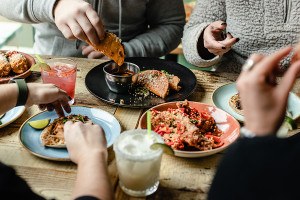Four Star Farms Leading a Hops Revolution in New England
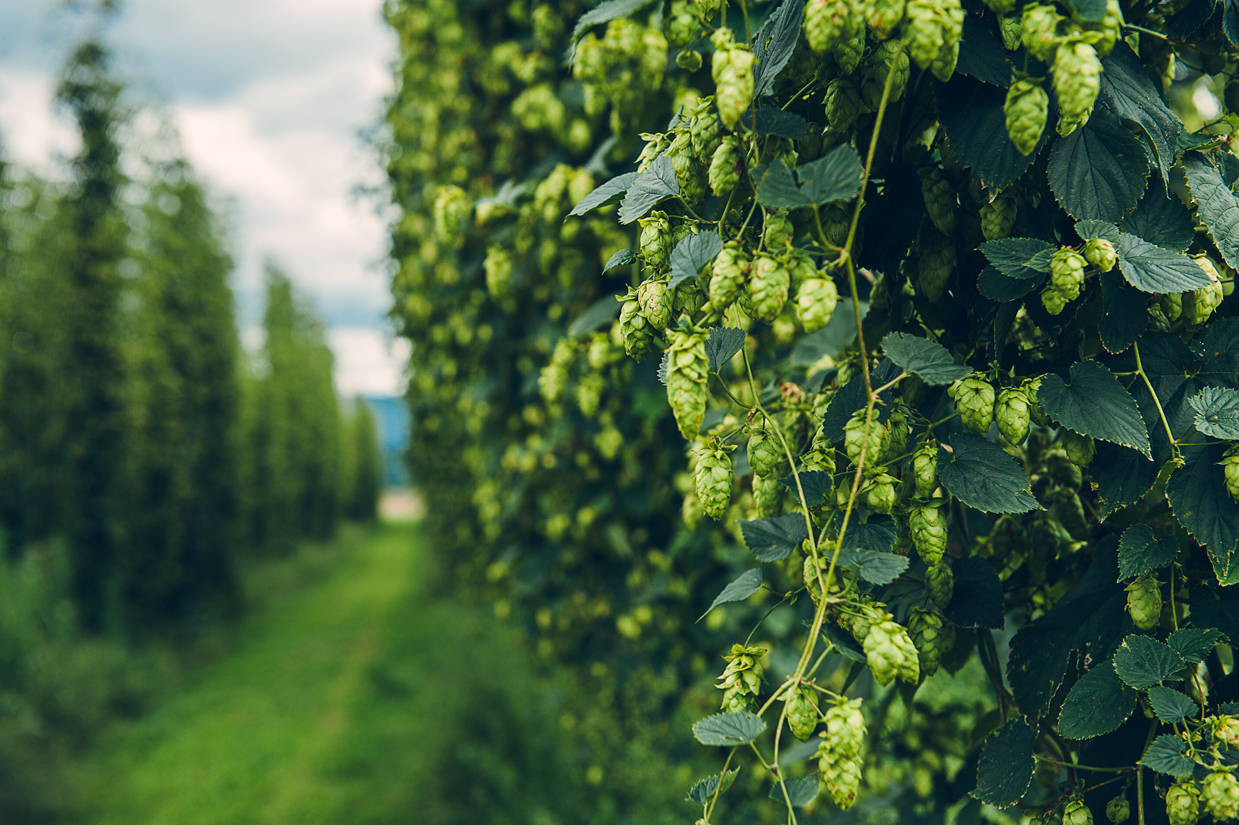
Mature hops at Four Star Farms in Northfield. Photo by Chelsea Kyle
“Drinking local” has always been a bit of a half-truth in New England. Outside of the Pacific Northwest, American brewers are sourcing hops and grain from as far as New Zealand and Australia. If you’re doing the math, that amounts to half of an ancient, four-ingredient formula. This hasn’t always been the case, of course. Hop roots were among the items brought to the Massachusetts Bay Colony in 1629. And until 1840, Middlesex County, along with Hillsborough in New Hampshire, was a predominant source of hop production.
Now a handful of pioneering plant specialists, brewers, and farmers are trying to change that. The L’Etoile family from Four Star Farms in Northfield has been one of the biggest proponents of this “all local” push. In just three years, Four Star Farms has gone from an experimental three-quarter acre plot of Cascade, Magnum, and Nugget hops, to seven diverse acres that will yield upwards of 5,000 pounds of dry hops in 2014. Each trellised row now boasts mature plants reaching up to 21 feet high, their resiny cones perfuming the air like a pungent fog.
“Initially, we called the hops our test plot to see if we could even do it,” says Liz L’Etoile, director of sales and marketing. “About five years ago, there wasn’t that much access to information regarding how to build the infrastructure for a hop yard or how to maintain the plants. So we started with three-quarters of an acre and tweaked things as we went. But at the time, we really didn’t know if was going to work. We were also picking everything by hand and that was just impossible. Keeping up with orders was a losing battle. But ultimately we decided we could grow hops, there was a lot of demand for them, and there were a lot of great brewers who were supporting us.”

From left: Robin, Jacob, Edith, Hugh, Liz, Nathan, Gene, and Bonnie L’Etoile. Photo by Chelsea Kyle
Located along the banks of the Connecticut River, Four Star now practices diversification, growing 130 acres worth of wheat, spelt, rye, barley, corn, and triticale, to help subsidize their growing hop operation. But when Eugene and Bonnie purchased the former dairy farm in 1986—leaving their respective careers in engineering and academia—they were focused on only one crop: turf. That all changed in 2006 though, when their sons Nathan and Jacob expressed interest in joining the family business.
“Four Star was a monocrop farm that had only ever grown turf—grass for people’s lawns,” Liz says. “At that same time that Jacob and Nathan decided to come back, the housing market burst. Turf sales follow housing sales, and Bonnie and Gene realized that it was no longer going to be enough to support three families. There had to be other things we were doing. Bonnie noticed that grains were missing from the local landscape and we had always used grains as a cover crop. So we gave that a go. Then Gene said, ‘You know what goes great with grains? Hops! Then we could make beer.’”
Jacob left his job as an engineer and moved onto the farm with his wife, Robin, and their two children, Hugh and Edith. Nathan, the former Assistant Commissioner of Agriculture for Massachusetts, followed suit, moving into a third house on the property with his wife, Liz. Then they got started, taking the small amount of knowledge Gene picked up touring German hop yards, and applying it to their test plots.
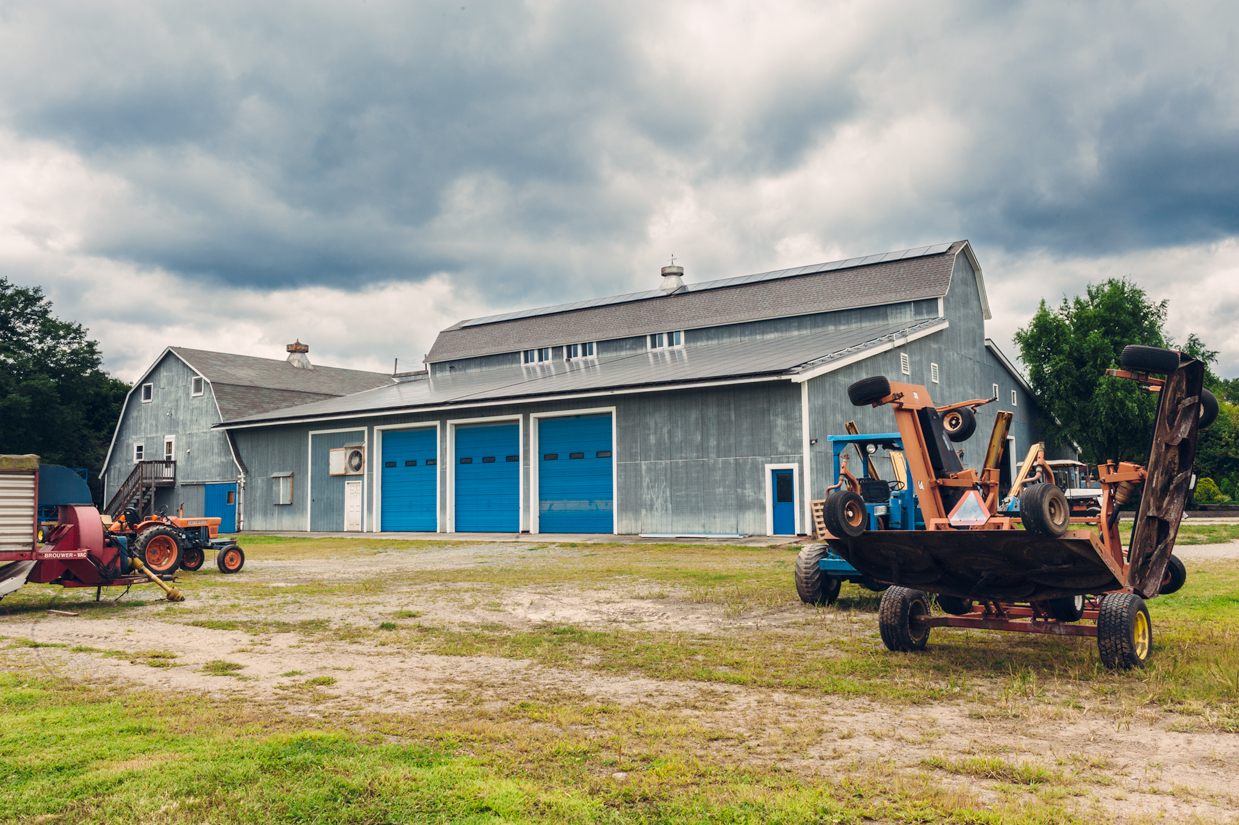
Photo by Chelsea Kyle
“The interesting thing about our farm is that we’re really overeducated people,” Liz says. “Gene and Jacob are both engineers. I have a master’s degree in social work. Nathan has a finance degree. My mother-in-law has a master’s in food science. It’s actually proven to be a really good variety of knowledge. All of those things have come in handy. We’re at the point where we’re too big to be a small hop farm, but we’re also too small to be a big hop farm. So that means we have to make most of our own equipment and do all the farming ourselves.”
Since beginning their endeavor, the L’Etoile family has dealt with any number of obstacles: mildew, fog, heavy summer rains, and a plant that prefers desert-like conditions. But by far the most challenging hurdle has been getting their product into the hands of brewers and breaking into a system that thrives on long-term contracts.
“A lot of brewers are stuck in hop contracts that leave very little wiggle room,” Liz says. “Those contracts can be from three to seven years, and maybe even longer, depending on which varieties they’re hoping to get. It makes it a challenge when brewers have dollars tied up, to be able to supplement any difference with our hops. A lot of brewers have made strides to start doing that, but it’s going to take a lot more work. And we need to show them that we can grow a quality product year after year, with really good yields they can rely upon.”
Last year’s 1,200 pound hop harvest became Four Star’s first viable yield. That might be a pittance in the context of large-scale operations like those in Washington’s Yakima Valley, but volume was never the objective, especially at this point in the L’Etoile’s tenure. There are a number of ways to measure success, and for the family that meant breaking into that tight-knit fraternity of New England brewmasters.
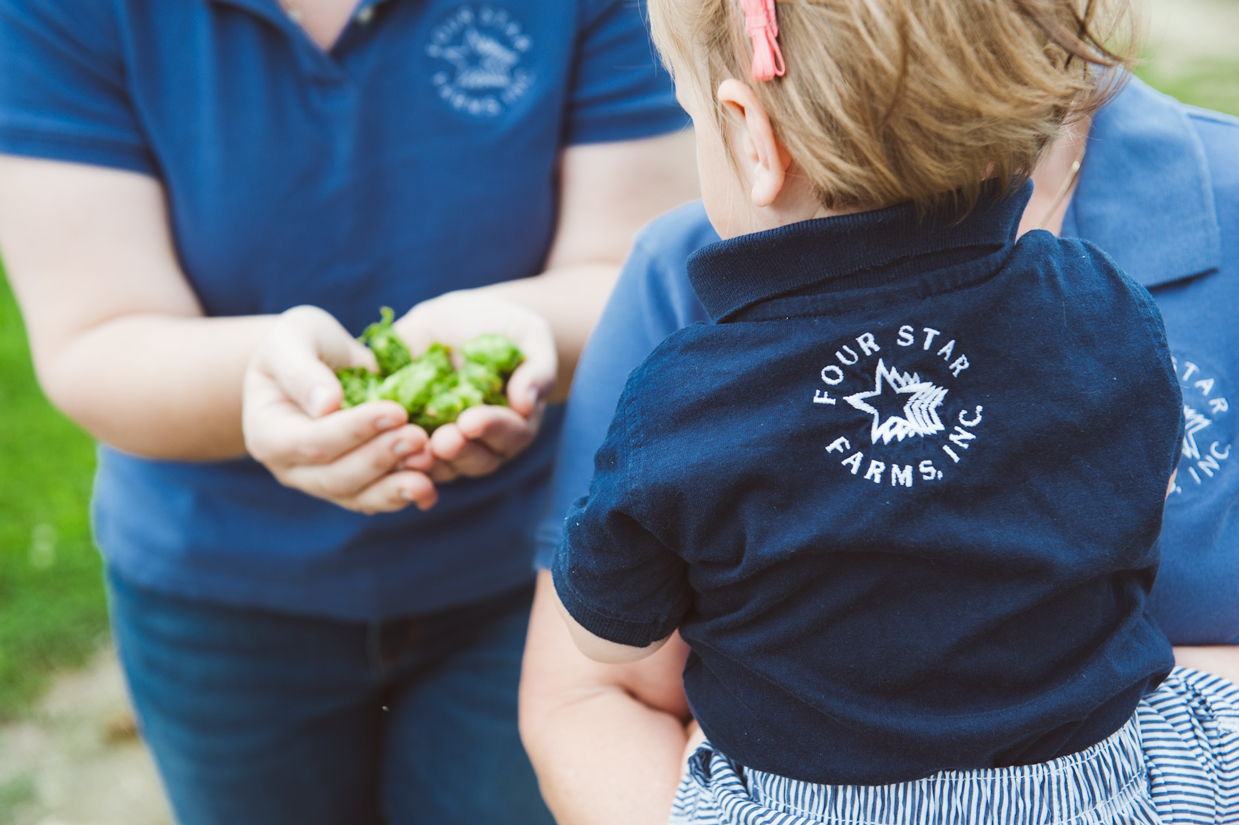
Liz showing off some hops to Jacob’s daughter Edith. Photo by Chelsea Kyle
Already in 2014, they’ve received orders from Aeronaut, Jack’s Abby, Rapscallion, Wormtown, Berkley Beer Company, The People’s Pint, StoneMan Brewery, and Independent Fermentations in Plymouth. They’ve also teamed up with Isinglass River Hops Exchange, New England’s first hop processing and distribution company, and are now able to offer pelletized hops, which are crucial to most professional brewing systems. That advancement has opened even more doors, drawing the attention of Cambridge Brewing Company’s Will Meyers and JC Tetreault of Trillium.
Even though the L’Etoiles say they don’t want to expand too fast and oversaturate the market, they plan on adding another three acres of hops by next year. After that, and with 280 total acres at their disposal, anything is possible. But for now, Liz and her family are just enjoying the new enterprise and a group of co-workers she can—without exaggeration—call her family.
“Working on the farm has been a wonderful opportunity because I’m working with people I really care about,” Liz says. “We have our disagreements and challenges, but we can be our real genuine selves with each other. That’s awesome because as a daughter-in-law I can’t imagine working with my own family so much. We spend all day together and then we’ll often have big family dinners together at night—and we all still really like each other. It’s really been this fascinating thing that we’ve been able to build, and I’m so excited about it.”
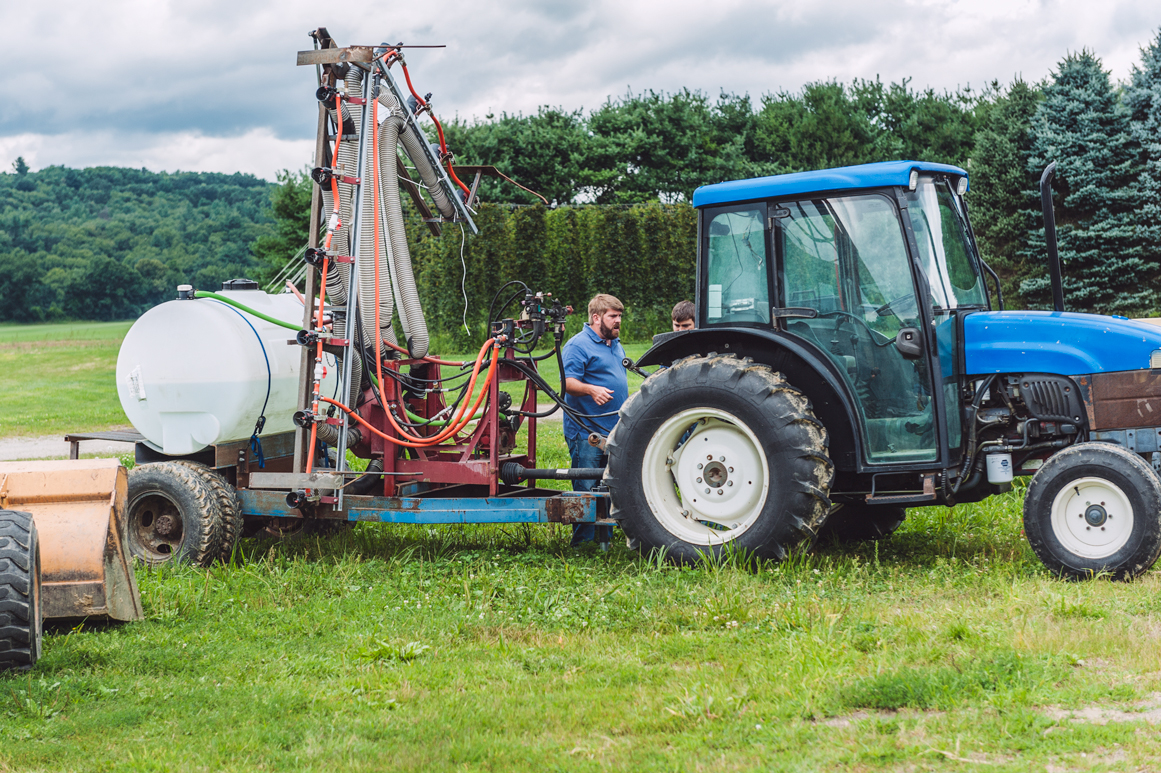
Jacob and Nathan working on a piece of harvesting equipment. Photo by Chelsea Kyle
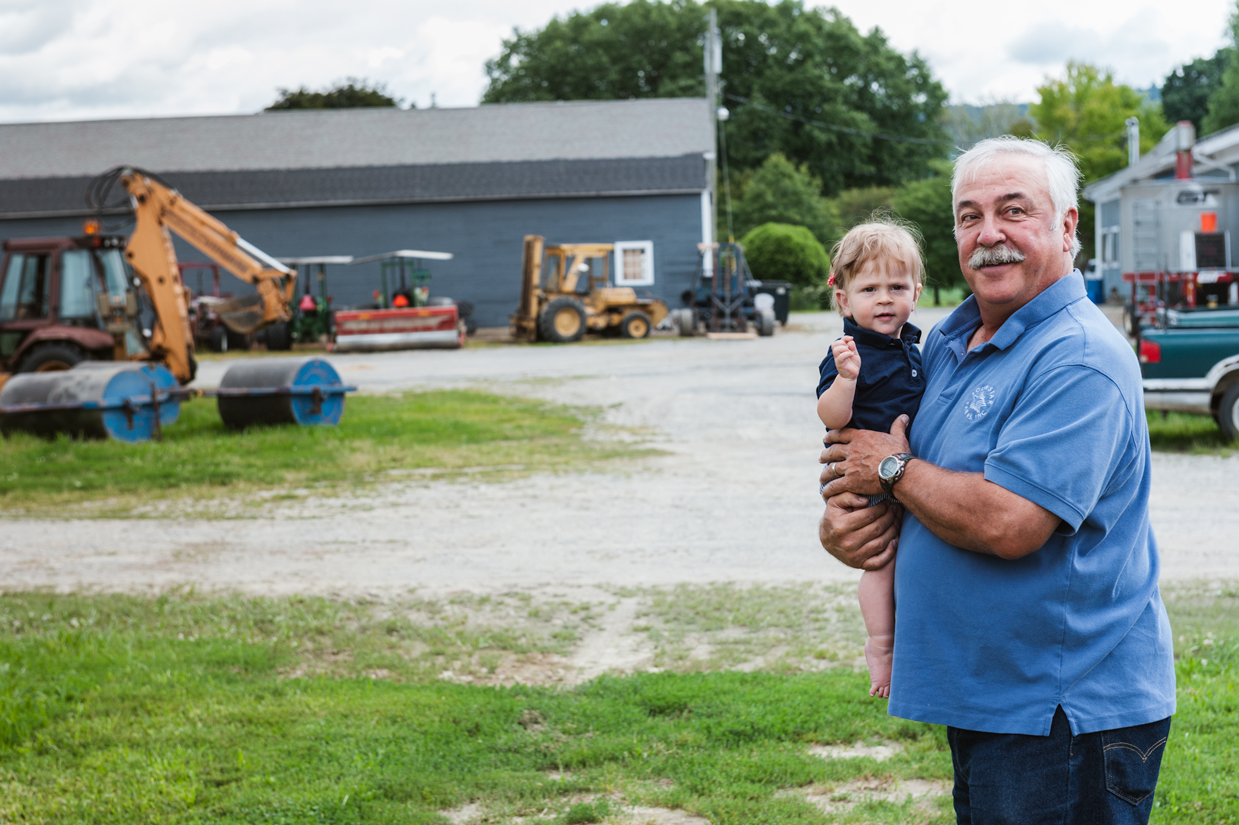
Eugene L’Etoile with his granddaughter Edith. Photo by Chelsea Kyle

Jacob L’Etoile’s son Hugh. Photo by Chelsea Kyle
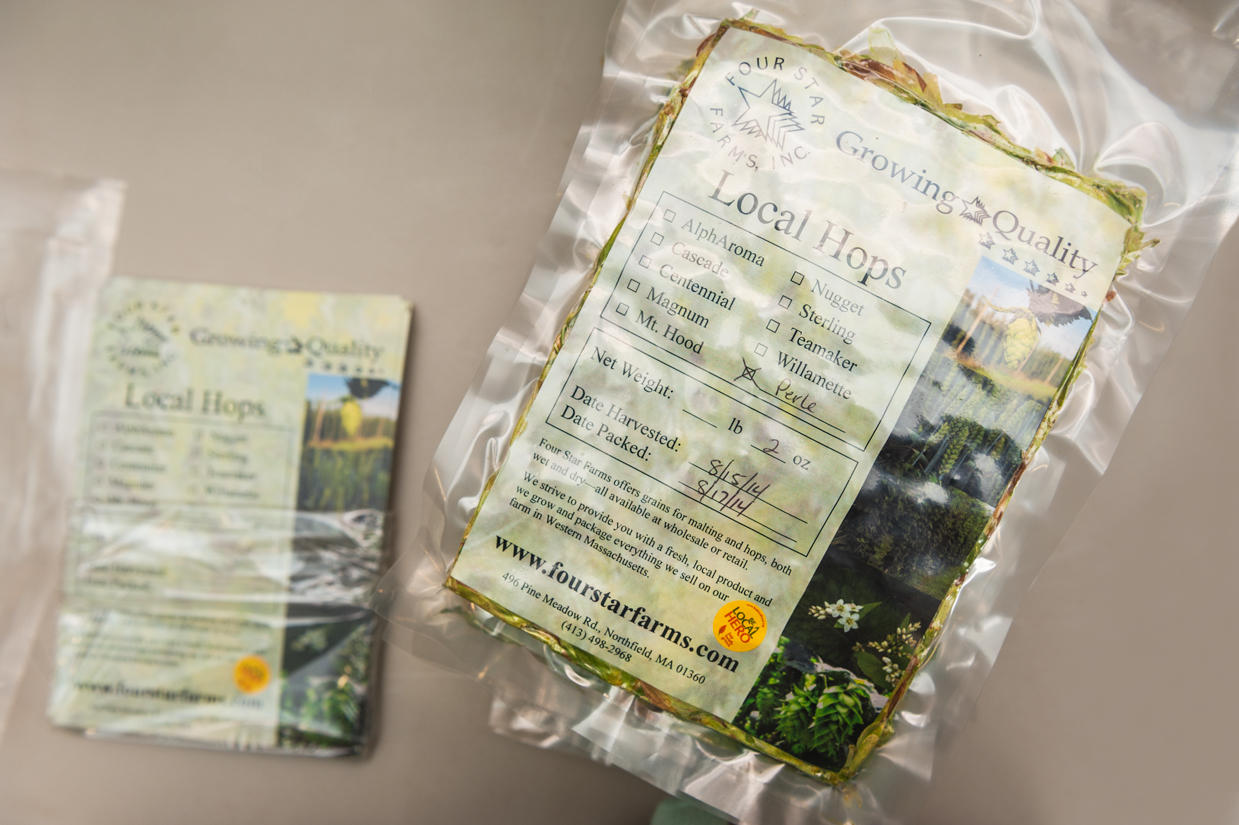
A bag of recently packaged Perle hops. Photo by Chelsea Kyle

Inside the Four Star hop barn. Photo by Chelsea Kyle
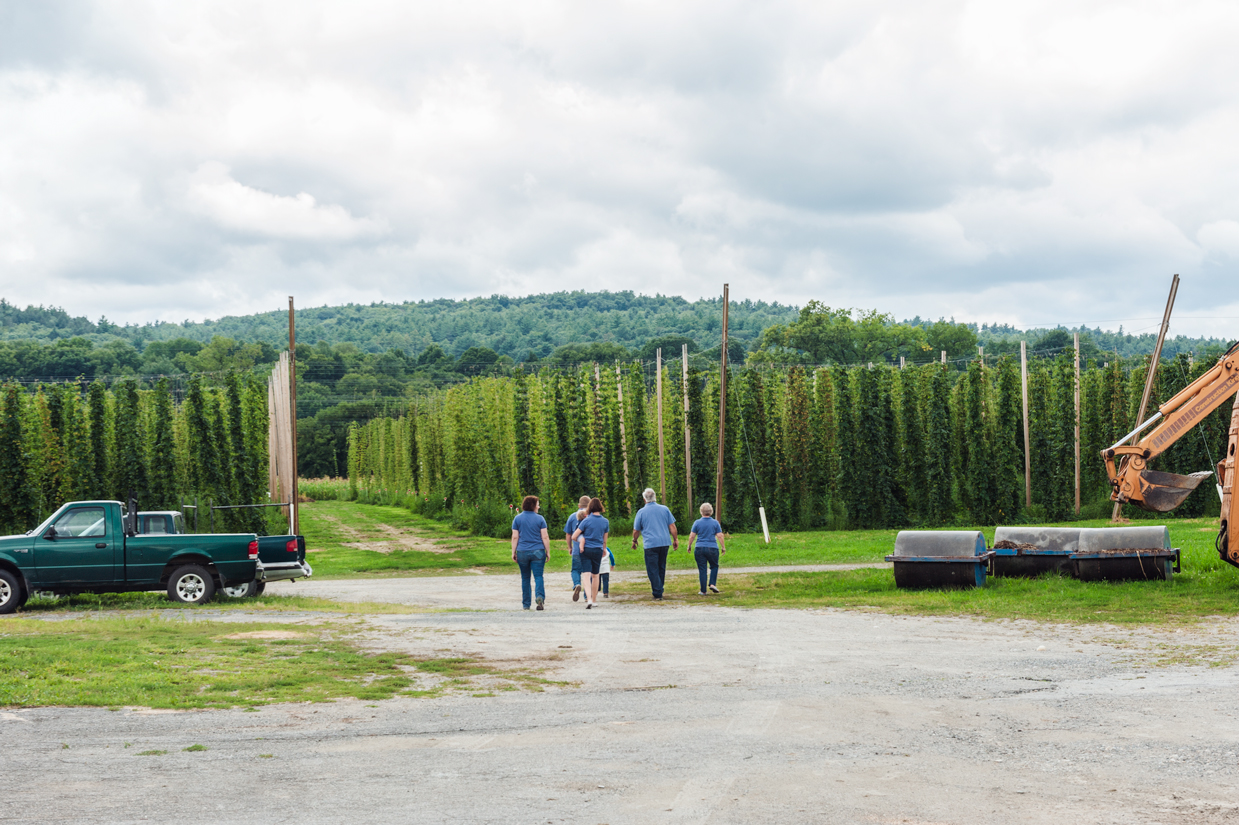
The L’Etoile family outside of their ten acres of hops in Northfield. Photo by Chelsea Kyle
Four Star Farms, Pine Meadow Road, Northfield, 413-498-2968, fourstarfarms.com.

